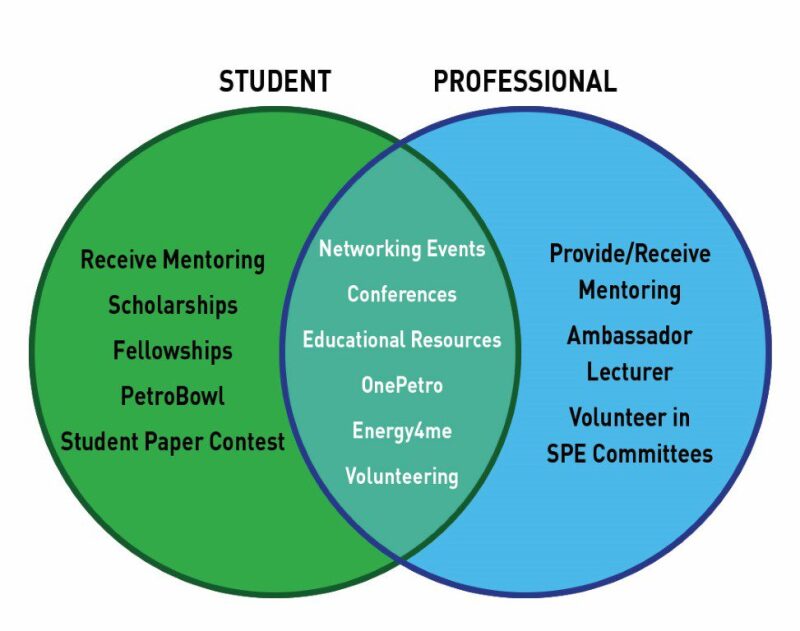With more than 164,000 global members from 143 countries, SPE is the largest individual member organization serving professionals in the oil and gas industry. The SPE network includes a wide demographic of professionals, including engineers, scientists, geologists, researchers, entrepreneurs, accountants, and students, among many others. All SPE members, irrespective of their background and experience level, can contribute to the collective success of the society through knowledge sharing, collaboration, and active participation.
Existing SPE members will undoubtedly agree that there are numerous benefits in joining SPE and maintaining one’s membership during university and throughout their careers. This article is intended to provide an overview of the differences between the two types of membership within SPE—professional and student—and to highlight the direct and intangible benefits of SPE affiliation after graduation.
SPE offers a range of benefits to its global member base. These primarily fall into two main areas:
- Technical and leadership skills development
- Professional network creation
The combination of these elements can bring about significant professional rewards and growth for members. Through the provision of a diverse group of programs and training, SPE ensures that its members are kept up-to-date on the most recent industry trends and advances.
There are several shared benefits between the student and professional memberships. Fig. 1 illustrates the specific and the common components of each membership category. As shown, both categories provide access to a variety of learning materials, competency management tool, networking events, training courses, conferences, and webinars at discounted prices. In addition, a myriad of options is available for members to utilize the educational platforms and get involved with volunteering initiatives, such as Energy4me; PetroWiki; OnePetro; SPE Cares; SPE publications editorial boards, and e-Mentoring, to name a few.

Young professionals (YP) can greatly benefit from their membership particularly in the later stages of university and early in their careers. There are countless examples of success stories involving YPs who through active involvement in SPE volunteering activities and their local SPE chapters have taken charge of their development and paved their path toward professional development. For instance, young members participating in the SPE e-Mentoring program have been introduced to new concepts or niche areas of practice in which they have ultimately developed globally recognizable expertise.
Besides the benefits discussed, YPs who retain their SPE membership after graduation enjoy benefits beyond those directly offered by the society: They gain a competitive advantage by demonstrating to hiring managers their passion in pursuing a career in the energy industry. SPE recognizes that the transition from a student to a working professional can, at times, be slow and supports members who wish to maintain their membership after graduation by offering professional membership free for the first year after graduation.
The importance of SPE membership is echoed by young members all around the world. Sean Pan from the University of Texas believes that SPE membership proved very valuable during his university studies.
Stepping out of college is a big challenge, because I need to build connections at a new place. SPE membership helps me greatly on this front. Through participation at SPE events, I get to know lots of like-minded young engineers and experienced professionals who are willing to provide mentorships to others. SPE events cover all facets of the oil and gas industry, and by attending different study groups I am able to keep up with industry activities and learn about the industry from various perspectives.
The merits of SPE membership can range from specific technical learning to high-level professional development offerings, including:
- Networking and mentoring. With SPE’s expanding membership and increasing number of new local chapters and sections each year, members can leverage the extensive professional network within the society. SPE-organized programs such as conferences, workshops, and mentoring sessions present plenty of opportunities for members to learn from and support fellow members around the world.
- SPE educational platforms. SPE encourages members to contribute to online resources such as PetroWiki and OnePetro. The strong culture of volunteerism motivates members to contribute to SPE’s mission, and encourages new members to join the society.
- Conference and training registration. SPE members may register for conferences and training courses at discounted rates.
- Engineering certification. SPE offers an engineering certification program to its professional members, promoting professional recognition of their skills. The SPE Certification is particularly valuable in regions where a government-mandated engineering license does not exist.
- Community engagement. SPE inspires members to give back to their communities. Numerous SPE sections and student chapters organize local community outreach events such as Energy4me presentations and Ambassador Lectures. Interested members can also organize community-service programs as part of the SPE Cares initiative, and inspire their local sections to hold community-service events along with regional conferences.
During the transition from a student to a professional, SPE membership can play an important role in creating and maintaining worldwide connections.
Kyle Richter, a production engineer with Occidental Petroleum, states that “SPE gave me and my wife the opportunity to meet new people after moving to a new city. Since then we have made lifelong friends with other SPE members. We have also been volunteering our time to help the industry and our community. SPE allowed me to be creative with fundraisers and events which led me to grow my leadership and interpersonal skills. I cannot think of anything better for a young person to be involved with than SPE—the opportunities to meet people, learn, grow, network, and help the industry and the community are truly rewarding and life-changing.”
SPE President Janeen Judah perfectly sums up the benefits of SPE membership in her comments about volunteerism: “2017 is my 40th year as an SPE member. … SPE has been extremely valuable to me not only in developing my engineering and leadership skills, but also in developing my personal network and connections throughout the industry across companies and countries.”
Closing Thoughts
Professional development begins well before we embark on our first jobs after graduation. The journey toward a successful career starts as we come to recognize our professional interests and aspirations. Early involvement in professional societies is the first step in the right direction as it presents an avenue for shaping and enhancing our professional identity.
SPE provides several programs to support its members throughout their careers and during the times of transition. Acquiring or maintaining your SPE professional membership can offer a multitude of benefits and maximize the chances of a good start in the industry after graduation.
If you are an SPE student member graduating this semester, tell SPE you are graduating.
| Becoming an SPE Member |
|---|
Acquiring SPE membership is a simple process that differs slightly depending on whether the individual is a working professional or a student. Both membership categories have been designed to provide accessibility to sufficient resources to support the progress of members at every stage of their development. The differences between professional and student memberships are mostly centered around the eligibility criteria, as well as the range of programs and the level of involvement members can have within the society. Individuals must meet the following minimum criteria to be eligible for SPE membership: Professional Membership
Student Membership
|

